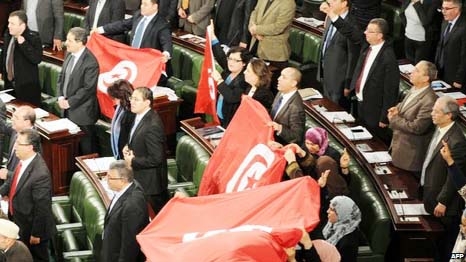
BBC Online :
There was a sense of joy, pride and relief inside the assembly, when it became clear that the new constitution had been adopted with an overwhelming majority.
Members of the public and the assembly gasped first, and then embraced each other, while they sang the national anthem.
Politicians here are hoping to send a message of stability and unity, not only to the Tunisian public, but also to international lenders.
If put into practice, clauses such as Article 45, which requires the government to create parity for women in all legislative assemblies in the country, are bound to make history.
The governing Islamist Ennahdha party made some concessions, most importantly the removal of references to Islamic law to get the text passed.
But large parts of the Tunisian public remain unconvinced that this constitution will actually make a difference to their lives. Many feel that the drafting process took too long.
Inflation and unemployment remain stubbornly high, while the coffers of the government are empty.
The cabinet consists mainly of independents and technocrats, and is expected to run the country until new elections. No date has been set for the polls. After the vote on Sunday, the Tunisian flag was unfurled and parliamentarians embraced each other inside the chamber.
“This constitution, without being perfect, is one of consensus,” AP quoted assembly speaker Mustapha Ben Jaafar as saying.
Parliament agreed the text on Friday after the governing Ennahda party granted a number of concessions, including dropping references to Islamic law. It guarantees freedom of worship but says Islam is the state religion. The text also recognises equality between men and women for the first time.
Ennahda, a moderate Islamist party, won the first democratic elections after long-time ruler Zine al-Abidine Ben Ali was forced from power in 2011.
But it has faced fierce opposition from secular groups, who have accused it being too close to militant groups – charges it strongly denies.

